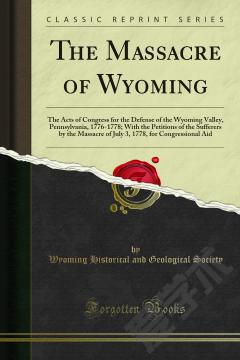The Massacre of Wyoming —— The Acts of Congress for the Defense of the Wyoming Valley, Pennsylvania, 1776-1778; With the Petitions of the Sufferers by the Massacre of July 3, 1778, for Congressional Aid
-----
No one with a love for the beautiful in nature can stand on the top of Prospect Rock on a summer day, and gaze upon the exquisite loveliness of the Wyoming Valley with out a thrill of admiration. Nor will he wonder that Indians and white men could have battled with each other for the possession of so fair a domain. Its beauty was doubtless fa. Greater one hundred and thirty years ago, before art had entered to change the face of nature, when the forest was broken only here and there by a few clearings and cabins, and the silence unbroken except by the voices of nature. It doubtless appeared a Paradise to the little band of colonists who came here in 1762, and were made to suffer so sorely in the Indian Massacre of 1763. Else, why did a second colony from Connecticut essay in 1769 to recover what had been so mercilessly wrested from them six years before? Willing to endure, as they did, a series of disasters for the next twenty years or more, they settled, cleared, built and sowed with the desperate resolve to retain possession at the peril of life and fortune. During the years preceding the Revolutionary War, from 1769 to 1775, so frequent were the conflicts resulting in bloodshed within the town of Westmoreland, that it may be said to have been in a state of continual war. It was a repetition of the experience of their New England ancestors, who went to the plow and the church with the trusty rifle slung over their shoulder.
{{comment.content}}








 京公网安备 11010802027623号
京公网安备 11010802027623号